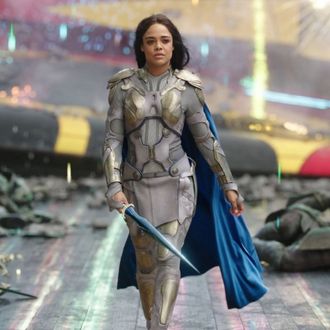
After the seismic shake-ups of Avengers: Endgame, the Marvel Cinematic Universe is poised to become a lot more diverse, as Marvel Studios seeks to introduce new superheroes in an expanding assortment of genders, ethnicities, ages, and sexual orientations.
Victoria Alonso, the studio’s executive vice-president of production, tells Vulture that a move beyond the long-established standard of white male superheroes like Iron Man, Captain America, Thor, and Spider-Man isn’t just reflective of a more inclusive culture, it’s a sound business model.
“The lesson with Captain Marvel and Black Panther, where the combined efforts of those two movies is $2.4 billion, is if you don’t do it, you’re leaving money on the table,” said Alonso. “This is show business — there’s a business part to the show. Don’t leave money on the table. Just commit to it.”
Beyond the potential profit margins, Alonso said an increasingly diverse roster of heroes, villains, and supporting characters is a top priority for the studio’s future films. “We’re just determined to have it be how we do it,” she says. “And if we do it, maybe somebody else will do it … I encourage every studio, every indie production company, every filmmaker out there to make an effort.”
The studio already has diversity-minded projects percolating, starring both a stalwart of its 11-year film franchise, Scarlett Johansson’s superspy Black Widow, and a cult favorite from its comics library, Shang-Chi, an Asian martial-arts master.
Casting director Sarah Halley Finn, who has cast every Marvel film beginning with 2008’s Iron Man, anticipates an explosion of new faces in the MCU. “You’re gonna see even more new faces — and faces from all different background, all ages, all ethnicities, LGBTQ, people who are differently abled,” she says. Like many Hollywood productions, Marvel has been working with the Casting Society of America, which has actively been staging open calls for a underrepresented actors, including transgender, those with disabilities, and from the MENASA communities — Middle Eastern, North African, South American actors.
“It’s a priority to have authenticity, to increase representation, to give greater representation to actors who have not traditionally been represented in mainstream movies on the big screen,” says Finn.
Earlier this year, Marvel Studios president Kevin Feige told Vulture that the company also has been and remained open to changing the long-established genders, ethnicities, and sexualities of its comic characters for their film incarnations, as it has with supporting characters in the Thor sub-franchise like Heimdall (played by Idris Elba) and Valkyrie (Tessa Thompson). “There are a lot of other examples, so the answer is yes, “ said Feige. “You may be asking about sort of major, title characters. The answer to that is probably yes, too.”

